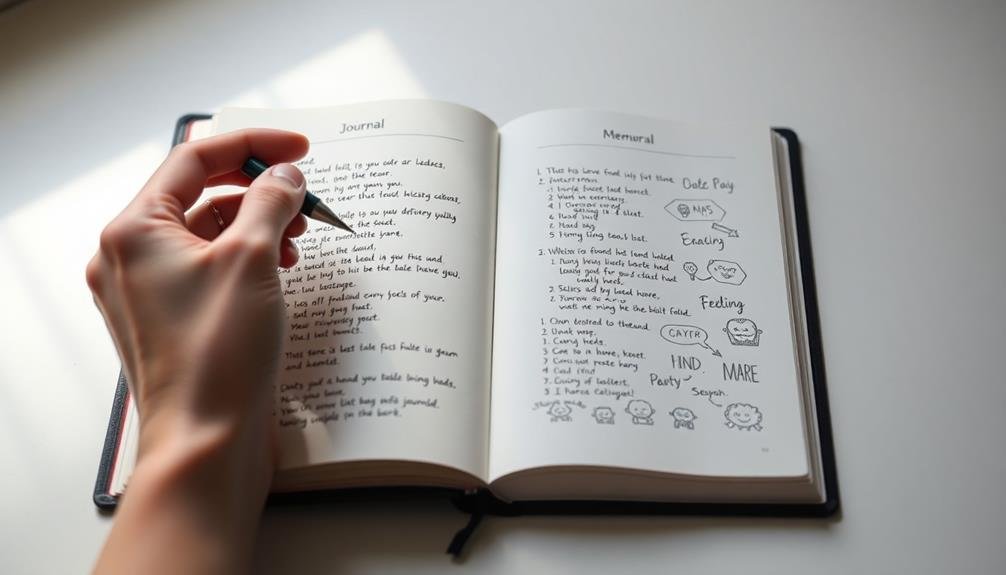Memory journaling can be a powerful tool to transform your anxiety. By regularly recording and reflecting on past experiences, you'll identify triggers, challenge negative thought patterns, and develop better coping strategies. Start by choosing a comfortable journal and creating a dedicated space for writing. Select memory themes that align with your anxiety-reduction goals, and structure your entries to include sensory details and emotional reflections. Incorporate mindfulness techniques to enhance your practice, and overcome common challenges like writer's block with prompts or guided questions. Building a consistent habit is key to reaping the full benefits of this transformative technique. Dive deeper to access the full potential of memory journaling for anxiety management.
Understanding Memory Journaling

Through the lens of mental health, memory journaling emerges as a powerful tool for managing anxiety. This practice involves recording your experiences, thoughts, and emotions in a structured manner, focusing on specific memories that trigger anxiety or stress.
Unlike traditional journaling, memory journaling emphasizes detailed recollection and analysis of past events. You'll find that memory journaling helps you identify patterns in your anxiety triggers and responses. By writing about anxious moments, you're able to process them more effectively, gaining insights into your thought processes and emotional reactions.
This method allows you to step back and observe your experiences objectively, reducing the immediate emotional impact. Memory journaling also aids in cognitive restructuring, a technique used to challenge and change negative thought patterns.
As you write, you're encouraged to question your interpretations of events and consider alternative perspectives. This process can lead to a more balanced view of your experiences, potentially reducing anxiety levels over time.
Additionally, the act of writing itself can be calming, providing a sense of control and release during moments of heightened stress or worry.
Benefits for Anxiety Management
Memory journaling offers powerful benefits for managing anxiety, particularly through stress reduction techniques.
You'll find that regularly documenting your experiences can help you identify and address stress triggers more effectively.
Stress Reduction Techniques
While memory journaling serves as a powerful tool for managing anxiety, incorporating additional stress reduction techniques can amplify its effectiveness. You'll find that combining these methods creates a thorough approach to managing stress and anxiety.
Start by practicing deep breathing exercises alongside your journaling routine. Take slow, deliberate breaths, focusing on inhaling through your nose and exhaling through your mouth. This simple technique can quickly calm your nervous system and reduce anxiety symptoms.
Progressive muscle relaxation is another valuable technique. As you write in your journal, pause periodically to tense and then relax different muscle groups in your body. This practice helps release physical tension and promotes a sense of calm.
Consider incorporating mindfulness meditation into your journaling sessions. Before you begin writing, spend a few minutes observing your thoughts and feelings without judgment. This can help you approach your journaling with greater clarity and self-awareness.
Improved Emotional Regulation
By engaging in memory journaling, you'll develop improved emotional regulation skills, an essential benefit for managing anxiety. As you write about past experiences, you'll gain a clearer perspective on your emotions, allowing you to process them more effectively. This practice helps you identify patterns in your emotional responses and triggers, empowering you to develop healthier coping mechanisms.
Memory journaling enhances your ability to navigate challenging situations by providing a safe space to explore and understand your feelings. You'll learn to differentiate between rational and irrational thoughts, reducing the intensity of anxiety-provoking situations. This increased self-awareness allows you to respond to stressors more calmly and deliberately.
| Emotional Regulation Skill | How Memory Journaling Helps |
|---|---|
| Self-awareness | Identifies emotional patterns |
| Impulse control | Encourages thoughtful reflection |
| Stress management | Provides outlet for processing emotions |
As you consistently practice memory journaling, you'll notice improvements in your overall emotional well-being. You'll become more adept at recognizing and managing anxiety symptoms before they escalate. This newfound emotional intelligence will positively impact various aspects of your life, from personal relationships to professional endeavors, ultimately leading to a more balanced and anxiety-free existence.
Gathering Your Supplies

Getting started with memory journaling requires minimal setup, but having the right tools can enhance your experience. Choose a journal that feels comfortable and inviting to you. Opt for a notebook with high-quality paper that won't bleed through when you write.
Consider the size carefully; it should be portable enough to carry with you but large enough to accommodate your thoughts comfortably.
Select pens or pencils that glide smoothly across the page. Colored pens can help you organize your thoughts or highlight important points. If you enjoy decorating your journal, gather some stickers, washi tape, or markers to personalize your pages.
Consider adding a small pouch or folder to your journaling kit to store mementos, photos, or ticket stubs that might trigger positive memories. A bookmark or page marker can help you quickly find your place.
Lastly, create a dedicated space for journaling. This could be a cozy corner in your home, a favorite café, or even a quiet spot in nature. Having a consistent location can help signal your brain that it's time to reflect and write.
Choosing Memory Themes
Selecting memory themes can provide structure and focus to your journaling practice. Choose themes that resonate with you and align with your anxiety-reduction goals. Consider categories like childhood memories, accomplishments, moments of joy, or personal growth experiences. You might opt for broader themes such as family, travel, or education.
To help you get started, here's a table of potential memory themes and their benefits:
| Theme | Examples | Benefits |
|---|---|---|
| Childhood | First day of school, favorite toy | Reconnect with innocence and joy |
| Achievements | Graduations, promotions | Boost confidence and self-esteem |
| Nature | Hiking trips, beach days | Promote calm and grounding |
| Relationships | First dates, friendships | Reinforce social connections |
| Personal Growth | Overcoming fears, learning new skills | Encourage self-reflection and progress |
As you write, don't limit yourself to positive memories only. Include challenging experiences you've overcome, as they can remind you of your resilience. Rotate through different themes weekly or monthly to maintain variety and engagement in your journaling practice. Remember, the goal is to explore memories that help reduce anxiety and promote emotional well-being.
Structuring Your Journal Entries

A well-structured journal entry can maximize the anxiety-reducing benefits of memory journaling. To create effective entries, start by dating each one for easy reference.
Begin with a brief description of your current emotional state and any anxiety triggers you're experiencing.
Next, explore the memory you've chosen. Describe it in vivid detail, focusing on sensory information like sights, sounds, smells, and textures. Include your thoughts and feelings from that time, as well as any physical sensations you remember.
Don't worry about perfect grammar or spelling; the goal is to capture the essence of the memory.
After recounting the memory, reflect on its significance. How does it relate to your current anxiety? What lessons or strengths can you draw from it?
Consider how your perspective on the memory may have changed over time.
Conclude your entry by noting any insights or shifts in your current emotional state. Has revisiting this memory affected your anxiety levels?
Include any action steps or affirmations that emerge from this reflection. By following this structure, you'll create meaningful journal entries that support your journey towards managing anxiety.
Incorporating Mindfulness Techniques
Mindfulness techniques can enhance the effectiveness of your memory journaling practice for anxiety management. As you write, focus on your breath and bodily sensations to ground yourself in the present moment. This awareness helps you separate from anxious thoughts and observe them objectively.
Try incorporating a brief meditation before journaling. Sit quietly for a few minutes, focusing on your breath. When thoughts arise, acknowledge them without judgment and gently return your attention to your breathing. This practice can calm your mind and prepare you for more insightful writing.
Use sensory details in your entries to deepen your mindfulness. Describe the sights, sounds, smells, tastes, and textures associated with your memories. This technique helps you fully engage with your experiences and may reveal new insights about your anxiety triggers.
Practice self-compassion as you write. Treat yourself with kindness and understanding, acknowledging that anxiety is a common human experience. This mindful approach can reduce self-criticism and promote emotional healing.
Regularly review your journal entries with a mindful perspective, noticing patterns and growth without judgment. This reflective practice can provide valuable insights into your anxiety management progress.
Overcoming Common Journaling Challenges

Many people face obstacles when starting or maintaining a memory journaling practice for anxiety. These challenges can range from finding time to write consistently to feeling overwhelmed by negative thoughts.
However, with the right strategies, you can overcome these hurdles and make memory journaling an effective tool for managing your anxiety.
To address common journaling challenges, consider implementing these solutions:
- Set a specific time each day for journaling, even if it's just for five minutes
- Use prompts or guided questions to overcome writer's block
- Focus on positive memories or gratitude when negative thoughts dominate
- Experiment with different formats, such as bullet points or stream of consciousness
Remember that perfection isn't the goal; consistency is key. If you miss a day, don't beat yourself up—simply start again the next day.
It's also important to be patient with yourself as you develop this new habit. Over time, you'll likely find that journaling becomes easier and more natural.
If you continue to struggle, consider seeking support from a therapist or joining a journaling group for accountability and encouragement.
Building a Consistent Practice
Establishing a consistent memory journaling practice is essential for maximizing its benefits in managing anxiety. To build a sustainable habit, start by setting a specific time each day for journaling. Choose a quiet, comfortable space where you won't be interrupted. Begin with short sessions and gradually increase the duration as you become more comfortable with the process.
Use these strategies to maintain your practice:
| Strategy | Description | Benefit |
|---|---|---|
| Set reminders | Use phone alerts or sticky notes | Keeps you accountable |
| Track progress | Mark completed days on a calendar | Provides visual motivation |
| Reward yourself | Treat yourself after milestones | Reinforces positive behavior |
| Join a group | Find or create a journaling community | Offers support and inspiration |
Don't be discouraged if you miss a day; simply resume your practice the following day. Experiment with different journaling techniques to keep your practice engaging. You might try stream-of-consciousness writing one day and structured prompts the next. Remember, consistency is key, but flexibility will help you maintain your practice long-term. As you continue, you'll likely notice improvements in your anxiety management and overall well-being.
Frequently Asked Questions
Can Memory Journaling Replace Professional Therapy for Severe Anxiety Disorders?
Memory journaling can't replace professional therapy for severe anxiety disorders. While it's a helpful tool, you'll need a therapist's expertise for proper diagnosis and treatment. Don't rely solely on journaling for serious mental health concerns.
How Long Does It Typically Take to See Results From Memory Journaling?
You'll likely see initial benefits from memory journaling within a few weeks. However, consistent practice over several months can lead to more significant improvements in managing your anxiety. Remember, everyone's journey is unique, so be patient with yourself.
Is It Necessary to Share My Memory Journal Entries With Others?
No, it's not necessary to share your memory journal entries with others. Your journal is personal, and you're free to keep it private. However, if you're comfortable, sharing can provide additional perspectives and support.
Can Digital Journaling Apps Be as Effective as Handwritten Memory Journals?
Yes, digital journaling apps can be just as effective as handwritten memory journals. You'll find many apps offer similar benefits, including easy access and search features. Choose the method that feels most comfortable and convenient for you.
Are There Any Potential Negative Effects of Memory Journaling for Anxiety?
While memory journaling can be beneficial, you should be aware of potential drawbacks. It might trigger distressing memories, lead to rumination, or increase anxiety if you focus too much on negative experiences. Always prioritize your mental well-being.
In Summary
You've now got the tools to transform your anxiety through memory journaling. Remember, it's a journey, not a race. Start small, be consistent, and don't judge yourself. As you practice, you'll find it easier to focus on positive memories and mindful moments. Embrace the process, celebrate small wins, and be patient with yourself. Over time, you'll notice a shift in your perspective and a reduction in anxiety. Keep writing, keep growing.





Leave a Reply